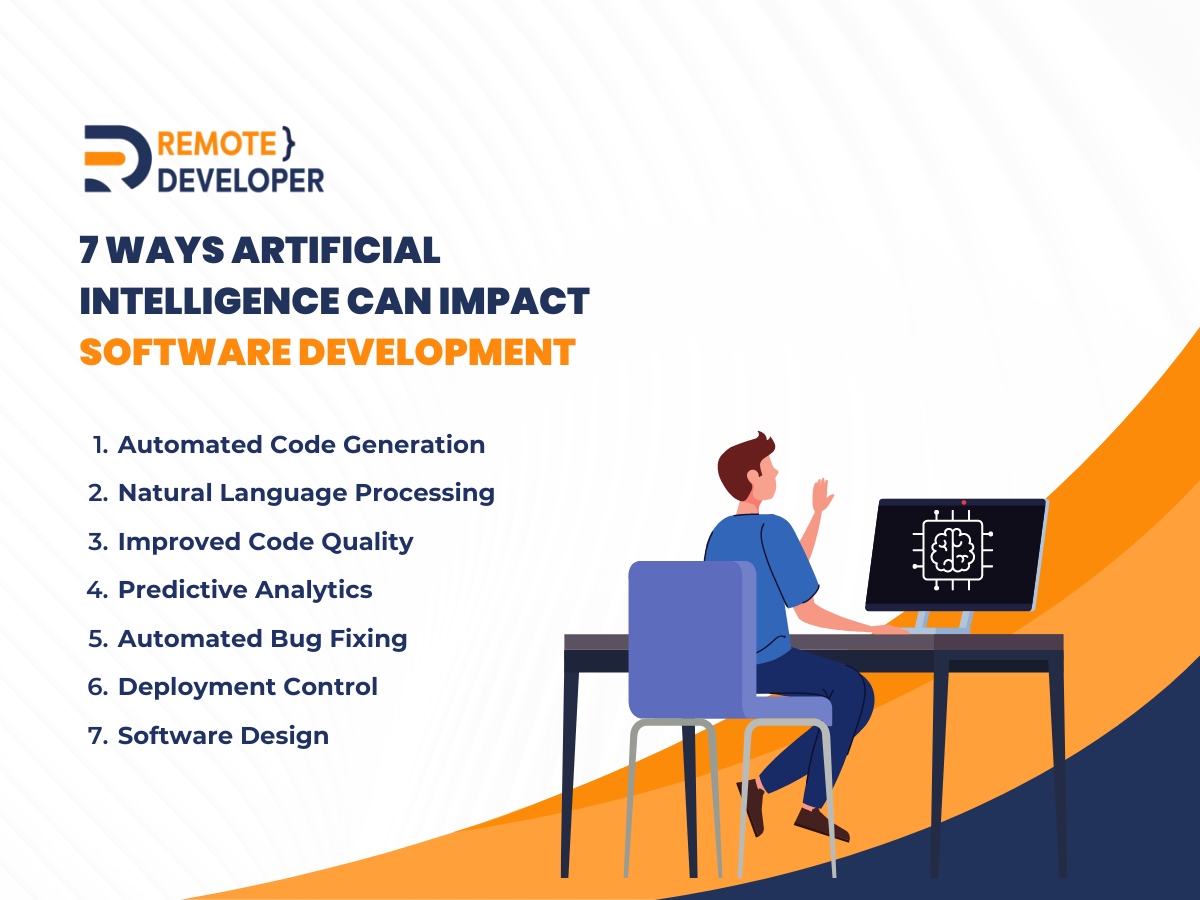Imagine a world where software development becomes an effortless and streamlined process. It is when the barriers of coding complexities are shattered, and innovation knows no bounds. This is already closer to reality thanks to artificial intelligence.
This innovative technology’s impact on modern software development has been nothing short of revolutionary. So, in this article, we will delve deep into its profound influence and how software engineers will benefit from this.
7 Ways Artificial Intelligence Can Impact Software Development
With that said, here are seven compelling ways in which artificial intelligence technology is reshaping IT software development.
Automated Code Generation
Traditionally, software engineers and developers face the dilemma of investing time and effort upfront while staying within schedule. Automating code generation offers a refreshing solution for this. It saves them the time-consuming and labour-intensive task of writing code for any software development project.
Basically, it is like having a super-smart assistant that creates intricate software systems in no time at all. This is made possible by tools like AutoML and AutoCode. Automated code generation works by analysing data first and then writing out the code.
However, it is important to point out that this approach can potentially fall short when faced with uncertainties. Even so, it can be a useful tool to lighten the load to a significant extent.

Natural Language Processing
Because of natural language processing technology, artificial intelligence can understand and interpret human language much better. Basically, software engineers can build software systems that understand and respond to natural language input.
Moreover, natural language processing technology enhances the user experience in software development. This enables software engineers to interact with article intelligence with more ease and efficiency. Overall, it minimises any potential uncertainty to rise with the program and saves time in the process.
More Improved Code Quality
It can enhance the quality of the code created for your software development project as well. Engineers and developers now have the ability to detect potential bugs and errors in the code even before they start writing it.
This is possible because of the use of handy tools like automated testing and code analysis. Automated testing generates test cases and executes them against the software to uncover any problems that may exist. On the other hand, the code analysis tool utilises algorithms to scrutinise the code and identify possible concerns. This includes security vulnerabilities and performance bottlenecks.
Predictive Analytics
The impact on software development also extends to the realm of predictive analytics. It is an innovative approach that makes predictions about future events based on the available data given.
In the case of software development, predictive analytics empowers software engineers and developers can further optimise a software’s performance by anticipating user behaviour. It can also be used to identify potential performance bottlenecks and resolves them before it becomes an issue.
With this in mind, predictive analytics enables a software development company to produce software products that are high-quality, efficient, and effective. It can also help developers and engineers to make informed decisions and essentially save more time and money down the line.
Automated Bug Fixing
As its name suggests, it is a tool that automatically identifies and fixes bugs during software development.
This is done with a two-step process. First, machine learning algorithms to spot potential bugs in the code. Second, automated bug repair comes in to resolve these issues.
With that said, automated big fixing is a boon for any software development company. It can improve the overall reliability of a software product. In addition, a good product ensures businesses can maintain consumer trust.
Deployment Control
Another positive impact is deployment control. For a software development company, these advancements have increased the efficiency of software deployment activities—essentially making the whole process smoother. In addition, even after the initial launch, upgrading programs or apps will also be conducted with ease and with fewer turnaround cycles.
Before, when developers make errors during the upgrade process, there is a significant risk involved in executing the software. Encountering such vulnerabilities during upgrades can be prevented, which effectively reduces the risk of deployment failure.
Software Design
The impact of artificial intelligence on software development also extends to software design.
Designing software requires specialised knowledge and experience to come up with the best technological solution. That is why it can be challenging for designers to settle on the right design at each stage. Consequently, trial and error are commonly committed during this phase of development.
Usually, engineers and developers reach the desired solution by reviewing and adjusting the design based on client feedback. This is expedited thanks to artificial intelligence. These can automate complex processes, provide insight, and offer the most effective methods for software design. Moreover, these provide tailored designs and customised solutions based on clients’ requirements and preferences.
Benefits of Artificial Intelligence in Software Development
As we explore the impact of this innovative technology on software development, there are a couple of things that are becoming evident. The most apparent of them are the benefits, as listed below:
Support project flow
Artificial intelligence technology provides valuable support. It serves as a powerful tool for enhancing a software development project’s planning, designing, coding, testing, and reporting processes.
Identify bugs and errors easier
Integrating this smart tool makes bug and error identification easier. Quality assurance testers can examine executable files with bugs and errors easily.
Optimise debugging
The debugging process can be done with a breeze. Developers can just program this tool to follow rule-based systems which enable them to spot common coding mistakes like null pointer dereferences or array out-of-bounds errors.
In addition, they can also be used to detect patterns in code that have historically resulted in bugs or might indicate their presence.
Streamline testing
Software testing takes up a lot of time and is prone to human errors. Luckily, this innovative tool can take care of time-consuming tasks and ensure a higher-quality product with fewer errors. In addition, it can generate test data to simulate realistic conditions and spot irregularities that a human tester might overlook.
Enhanced software security
Software security is crucial since it safeguards businesses from malware attacks and avoids jeopardising software integrity. This is made easier with the help of artificial intelligence.
Here are a couple of ways how it strengthens software security:
- Swiftly identify patterns of malicious behaviour by analysing data sets.
- Scans code to uncover potential vulnerabilities and offer practical recommendations to address them.
- Respond to cyber threats in real-time and alert security teams to any suspicious activity
Limitations of Artificial Intelligence in Software Development
Of course, aside from its benefits, this innovative technology also has its limitations that are worth noting as well.
Algorithmic bias
Artificial intelligence learns based on the data that it is fed. Naturally, this will also pick up on and reproduce the biases from the information it is given.
Learning inaccuracies
Aside from bias, the data that is being provided can also result in learning inaccuracies. In addition, it consistently requires up-to-date information. If there is no regular training, then it will start providing outdated outputs.
Limiting creativity
While any artificial intelligence robot can lighten the workload, it does not have the same level of creativity as humans. What it does is that it draws upon existing ideas to generate innovative solutions. That is why it is better as an assistant for repetitive tasks.
Higher costs
Integrating artificial intelligence technology in software development requires an upfront investment. These encompass its development, training, data, integration, hosting, and continuous maintenance.
With that said, another thing to keep in mind is that the costs may also vary depending on its complexity and the unique requirements of the user or organisation.
Final Thoughts
All of these just show that the power of artificial intelligence can revolutionise various aspects of software development. It can transform the way software engineers and developers plan, design, build, deploy, and maintain software systems.
It is a game-changer for a lot of reasons. It can automate time-consuming mundane tasks. It enables software teams to go straight to the prototyping phase and enhance end-user experience after the product is completed.
With that said, the future of software development shows a lot of promise as artificial intelligence continues to grow. Embracing this new synergy between human creativity and machine learning can lead to innovative technological marvels in the next couple of years.
Build great software with Remote Developer! Contact us now!

